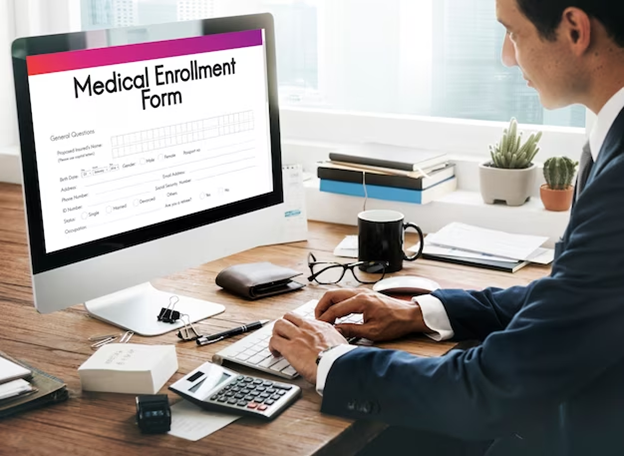Medical office billing and Management
This program teaches you all administrative tasks for the medical office such as managing patient records and handling payrolls and billings or budgets. The graduates work and participate in medical office management and medical facilities, like a hospital or private health clinic.
The program duration may vary, but it typically ranges from 12 to 18 months. Graduates of this program will be prepared for careers in medical office management and billing, working in medical offices, clinics, hospitals, and healthcare facilities to ensure efficient office operations and accurate billing and reimbursement for healthcare services.

Diploma in Medical Office Management and Billing Program
Duration: Typically, 12-18 months (varies by program).
- MEDOM 100: Introduction to Medical Office Management
- Overview of the role and responsibilities of a medical office manager
- The importance of effective office management in healthcare
- Ethical considerations in medical office management
- HSPC 100: Healthcare Systems and Patient Care
- Understanding the healthcare system and patient care
- Medical ethics and patient rights
- Interactions with healthcare professionals and patients
- MEDOO 100: Medical Office Operations and Workflow
- Managing daily office operations and workflow
- Appointment scheduling and patient registration
- Office organization and efficiency
- HIBF 100: Health Insurance and Billing Fundamentals
- Introduction to health insurance and billing terminology
- Health insurance types and claims processing
Insurance coverage and eligibility verification
- MEDCS 100: Medical Coding Systems (ICD-10 and CPT)
- Introduction to ICD-10 and CPT coding systems
- Assigning diagnosis and procedure codes
- Coding guidelines and accuracy
- HRBP 100: Healthcare Reimbursement and Billing Processes
- Preparing and submitting insurance claims
- Handling claim denials and rejections
- Appeals and resubmissions
- OBFM 100: Patient Billing and Financial Management
- Patient billing statements and invoices
- Explaining insurance coverage and patient responsibilities
- Payment plans, collections, and financial management
- EHRS 100: Electronic Health Records (EHR) and Software
- Use of electronic health records (EHR) systems
- Billing software and practice management tools
Data entry and claim submission
- SMCOM 100: Staff Management and Communication
- Recruiting, training, and supervising office staff
- Effective communication and teamwork
- Conflict resolution and performance evaluations
- PMPR 100: Practice Marketing and Patient Relations
- Marketing and patient acquisition strategies
- Patient satisfaction and retention
- Public relations and community engagement
- CLA 100: Compliance and Legal Aspects
- Healthcare regulations and compliance
- Understanding the Health Insurance Portability and Accountability Act (HIPAA)
- Risk management and liability in healthcare.
- CLIEP 100: Clinical Experience and Practical Training
- Practical experience in a medical office setting
- Managing billing and coding for real patient cases
- Gaining hands-on experience in medical office management
- CEPREP 100: Certification Exam Preparation
- Review of medical billing and coding certification exams (e.g., Certified Professional Biller – CPB)
- Mock exams and test-taking strategies
- State-specific requirements and regulations
- FASSC 100: Final Assessments and Certification
- Successful completion of clinical experience and training
- Successful performance in the certification exam
- Graduation and award of the Diploma in Medical Office Management and Billing
Students have to contact the school administration if they want to take extra credits or transfer credits to pursue the Diploma Certificate or Associate of Applied Science (A.A.S.) Degree in their field of interest. Students will select required number courses in each of the areas listed to meet general education requirements graduation for the A.A.S. Some of these courses can be transferred directly from and to the university system and may be substituted for recommended courses on the outline. Students should speak with an advisor before doing so these selective courses are required for all students.
- Selected Communication Course (Choose two for Diploma or three for the Associate)
ENGL 100: Fundamentals of Speech
CPL 100: Career Planning
CPL 101: Communications and Career Strategies
ENGL 101: Composition
ENGL 102: composition
- Selected Mathematics Course (Choose two for Diploma or three for the Associate)
MATH 100:General Math
MATH 101:Intermediate Algebra
MATH 102:College Algebra
- Selected Social Science Course (Choose two for Diploma or four for the Associate)
ECON 105:Leadership
ECON 101:Principles of Microeconomics I
ECON 102:Principles of Macroeconomics II
SOC 101:Introduction to Sociology
PSYC 101: Introduction to Psychology
HIST 101: History
